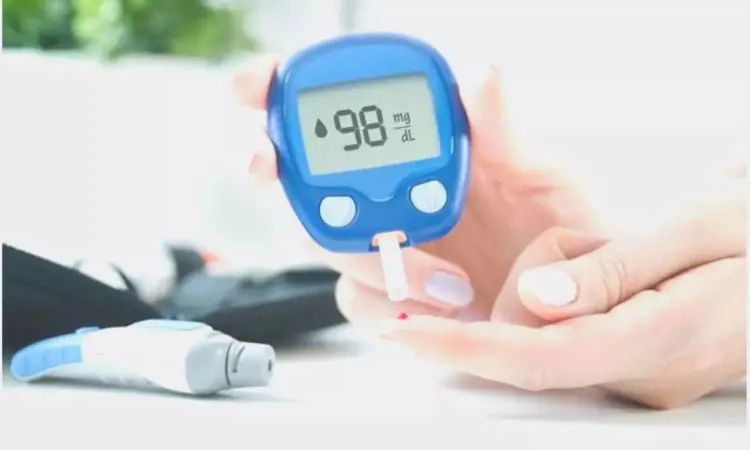- Home
- Medical news & Guidelines
- Anesthesiology
- Cardiology and CTVS
- Critical Care
- Dentistry
- Dermatology
- Diabetes and Endocrinology
- ENT
- Gastroenterology
- Medicine
- Nephrology
- Neurology
- Obstretics-Gynaecology
- Oncology
- Ophthalmology
- Orthopaedics
- Pediatrics-Neonatology
- Psychiatry
- Pulmonology
- Radiology
- Surgery
- Urology
- Laboratory Medicine
- Diet
- Nursing
- Paramedical
- Physiotherapy
- Health news
- Fact Check
- Bone Health Fact Check
- Brain Health Fact Check
- Cancer Related Fact Check
- Child Care Fact Check
- Dental and oral health fact check
- Diabetes and metabolic health fact check
- Diet and Nutrition Fact Check
- Eye and ENT Care Fact Check
- Fitness fact check
- Gut health fact check
- Heart health fact check
- Kidney health fact check
- Medical education fact check
- Men's health fact check
- Respiratory fact check
- Skin and hair care fact check
- Vaccine and Immunization fact check
- Women's health fact check
- AYUSH
- State News
- Andaman and Nicobar Islands
- Andhra Pradesh
- Arunachal Pradesh
- Assam
- Bihar
- Chandigarh
- Chattisgarh
- Dadra and Nagar Haveli
- Daman and Diu
- Delhi
- Goa
- Gujarat
- Haryana
- Himachal Pradesh
- Jammu & Kashmir
- Jharkhand
- Karnataka
- Kerala
- Ladakh
- Lakshadweep
- Madhya Pradesh
- Maharashtra
- Manipur
- Meghalaya
- Mizoram
- Nagaland
- Odisha
- Puducherry
- Punjab
- Rajasthan
- Sikkim
- Tamil Nadu
- Telangana
- Tripura
- Uttar Pradesh
- Uttrakhand
- West Bengal
- Medical Education
- Industry
Stress Hyperglycemia Ratio Identified as Reliable Predictor of AKI in CKD Patients: Study

A new study published in the journal BMC Nephrology revealed that Stress Hyperglycemia Ratio (SHR) is a dependable and independent marker for predicting the risk of acute kidney injury (AKI) and poor renal outcomes in patients with chronic kidney disease (CKD).
Among hospitalized patients, AKI is a common severe condition that carries a significant risk of death. It includes several causes, intricate processes, a high incidence, high death rates, and severe negative outcomes. Individuals who have AKI are 2.67 times more likely to develop or progress to chronic kidney disease, 4.81 times more likely to experience uremia, 38% more likely to experience cardiovascular (CV) events, 1.80 times more likely to die, and 32.4% more likely to readmit within 5 years.
An independent predictor of worse outcomes in critically sick patients is stress hyperglycemia (SH), a transient increase in blood sugar brought on by physiological or psychological stress. However, persistent hyperglycemia can influence fasting blood glucose (FBG) values, making it more difficult to differentiate them from acute hyperglycemia.
The stress hyperglycemia ratio has been proposed as a more accurate way to detect patients' real blood glucose levels. Diabetes mellitus (DM) does not affect SHR, which can measure the severity of SH by reflecting the pace at which fasting glucose levels fluctuate during stress. This study was set to investigate the relationship between SHR and the risk of AKI and mortality in people with chronic kidney disease.
The Medical Information Mart for Intensive Care-IV (MIMIC IV2.2) repository provided the data for this retrospective cohort study. AKI incidence was the main outcome, whereas in-hospital mortality and renal replacement therapy (RRT) were secondary outcomes. The restricted cubic spline (RCS) and Cox proportional hazards models were used to evaluate the relationship between SHR and the risk of AKI in CKD patients. After that, endpoint differences among different SHR levels are analyzed using Kaplan-Meier survival curves.
A total of 795 (31.8%) of the 2,500 CKD patients experienced AKI while in the hospital. The Cox proportional hazards analysis showed that the incidence of AKI and SHR were positively correlated. Greater SHR was associated with a greater risk of AKI, according to the RCS model, which displayed a roughly linear connection.
Overall, the use of SHR to AKI populations with CKD is broadened by this study. In order to improve risk assessment and direct follow-up care, particularly in the community population with diabetes, the SHR value may help in the prompt detection of AKI in people with CKD.
Source:
Li, J., Wang, L., Zhang, J., Li, X., & Jiao, Z. (2025). Association between stress hyperglycemia ratio (SHR) and the risk of acute kidney injury in patients with chronic kidney disease: analysis of the MIMIC-IV database. BMC Nephrology, 26(1), 310. https://doi.org/10.1186/s12882-025-04212-1
Neuroscience Masters graduate
Jacinthlyn Sylvia, a Neuroscience Master's graduate from Chennai has worked extensively in deciphering the neurobiology of cognition and motor control in aging. She also has spread-out exposure to Neurosurgery from her Bachelor’s. She is currently involved in active Neuro-Oncology research. She is an upcoming neuroscientist with a fiery passion for writing. Her news cover at Medical Dialogues feature recent discoveries and updates from the healthcare and biomedical research fields. She can be reached at editorial@medicaldialogues.in
Dr Kamal Kant Kohli-MBBS, DTCD- a chest specialist with more than 30 years of practice and a flair for writing clinical articles, Dr Kamal Kant Kohli joined Medical Dialogues as a Chief Editor of Medical News. Besides writing articles, as an editor, he proofreads and verifies all the medical content published on Medical Dialogues including those coming from journals, studies,medical conferences,guidelines etc. Email: drkohli@medicaldialogues.in. Contact no. 011-43720751


